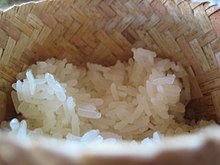Rice glue

Rice glue (Japanese: 続飯, romanized: sokui) is a gel or liquid adhesive made of a smooth mush of well-cooked white rice, diluted to the desired thickness with water.[1][2] It has been used since antiquity for various arts and crafts; for instance, it is a woodworking[1] and paper glue.[2] When dried, it is transparent.[2] Rice glue is notable for containing no acids which can degrade the materials it holds together.
It is still used in modern times to reversibly assemble joints; after it has dried, the glue can be soaked,[1] steamed, or split to re-open the joint;[1] on a small wood joint, the glue is resistant to tens of minutes of water immersion.[3]
It is sometimes mixed 1:1 with urushi lacquer to make nori-urushi (Japanese term), which is darker and dries faster than undiluted lacquer, and is used in making lacquerware.[1]
Rice glue is frequently used in Japan and in China.
See also
[edit]References
[edit]- ^ a b c d e Friesen, Dave (27 October 2015). "Making Sokui (Rice Paste Glue) - Historical Knifemaking". Crossed Heart Forge.
- ^ a b c "Mend a Paper or Shoji Screen". www.japangarden.co.uk.
- ^ Friesen, Dave (28 March 2014). "Sokui (Rice Paste Glue) Strength Testing". Crossed Heart Forge.
